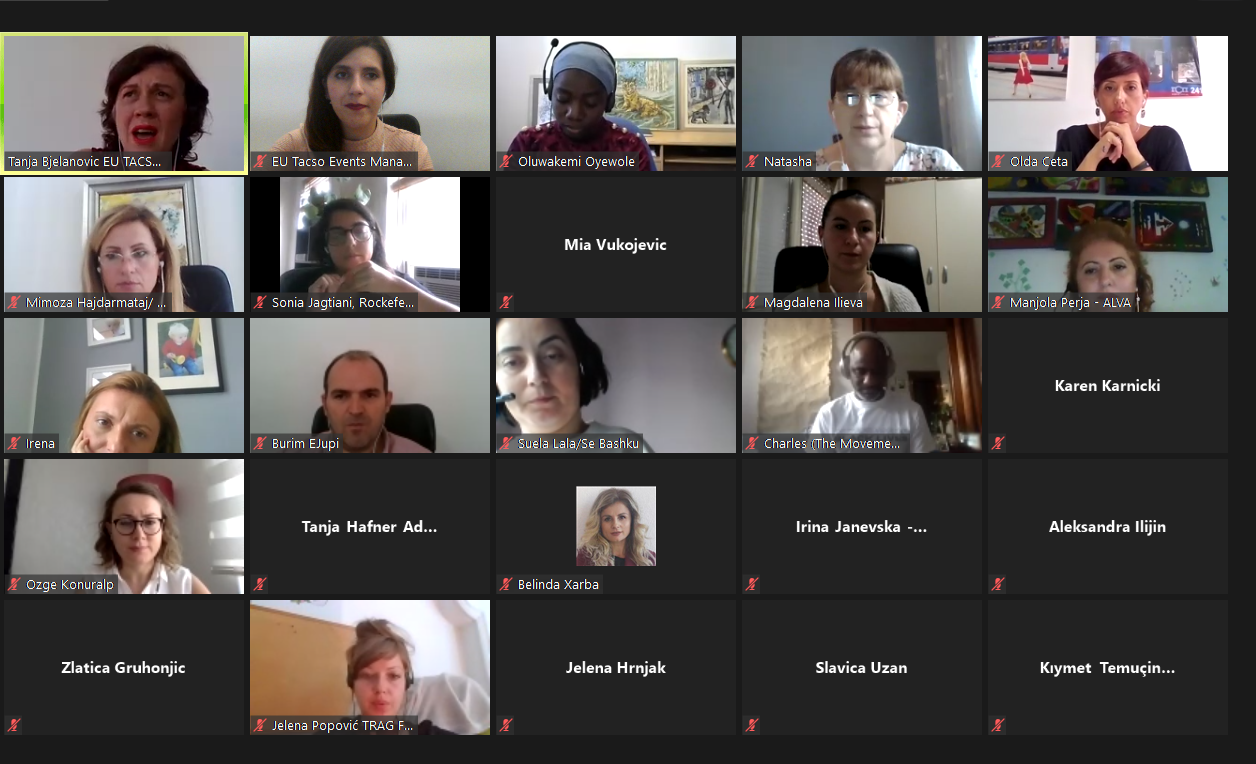
EU TACSO 3 in collaboration with the Rockefeller Brothers Fund (RBF) organised a P2P On-line meet-up event for civil society organisations (CSOs) from the Western Balkans and Turkey (WBT) on 24 September 2020, titled: The Role of Civil Society in Fight Against Racism and Other Forms of Discrimination: Lessons-learned from Black Lives Matter Movement for the Western Balkans and Turkey (WBT). Over 50 CSOs gathered on-line to raise the issue of anti-Black racism, intolerance, discrimination and police brutality, and discuss the role of civil society in addressing these issues within our societies.
Charles Long, Resource Coordinator for the Movement for Black Lives , provided the background for the topic and shared his personal experience, as well as insights and lessons learned as a representative of the movement in the United States. He informed how the totalitarianism of anti-Black racism is inscribed within the whole system, the police and the institutions in the US. He particularly emphasised the fact that “policing has always been about oppressing and controlling Black people”. He stressed the importance of the voiceless to express themselves, and suggested that what is needed is to “find people where they are” because real-life situations happen at the community level.
Oluwakemi Oyewole Kimi, Advocate in the Group of Young Women of Atina organization, shared her personal experience of discrimination at many levels as she arrived in the region as a migrant from Nigeria. Her case demonstrates how a person faces sever oppression at every level of society – citizens, public institutions, police etc., due to their multiple identities. Her story sadly confirmed how migrant women are among most discriminating communities in Serbia. “If there was not for CSOs, we would not be able to access our rights”, said Kimi. She concluded that women’s issues and gender equality are at the core of the many challenges we are facing in society.
The meeting resulted in the following key conclusions:
- Anti-blackness and white supremacy are now global phenomena;
- It is important that those who are impacted and affected speak for themselves;
- It is important that people stand up for themselves, while the support of civil society (CSOs) is helpful in that process;
- Black people rights-oriented organisations should be at the core of civil society that fights against racism;
- Bottom-up approach is needed: Hyper localised level is where the initiative should start from because that is the level in which the actual oppression happens;
- Comprehensiveness of human rights is the only way to go: Divisions or partially dealing with human rights is not accurate and effective.
Finally, participants concluded that “we in the Balkans do not know enough about anti-Black racism and should learn about it more.” Digging deeper into the learning about the history and current situation of Black Africans is needed. Civil society has an important role to play in this process and its influence should go beyond “closed circle of people” as there is the need to change the current narrative. “We need to cooperate more within civil society”, participants stated, “and making sure each day we have one organisation more that we cooperate with”. There is a need to find a way to make connections among civil society not only locally but also globally. EU TACSO 3 will invest extra efforts to respond to these needs and create new opportunities for learning and linkages within civil society.
You can also find at these links resources that could help you learn more about the topic:
- Watch: Chimamanda Ngozi Adichie’s TED Talk: The danger of a single story
- Watch: 13th on Netflix by Ava DuVernay (Documentary)
- Watch: Whose Streets by Sabaah Folayan (Documentary)
- Watch: When They See Us by Ava DuVernay on Netflix (TV Series)
- Watch: Just Mercy by Destin Daniel Cretton (Film)
- Read: A Guide to Allyship (all credits are listed in the document) – a comprehensive list of resources on many topics relating to Black Lives Matter
